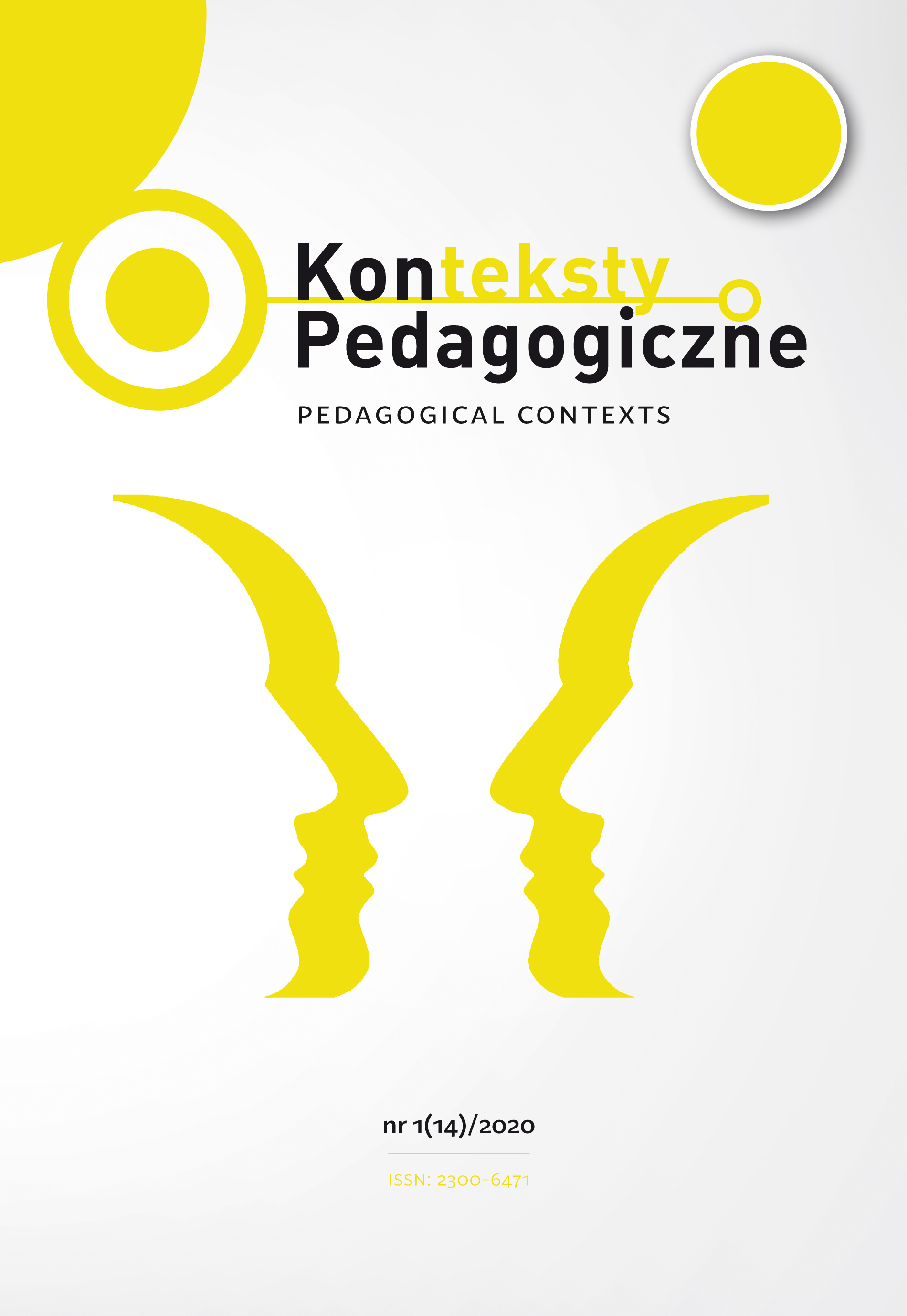Abstract
The purpose of this article was to evaluate the use of articulatory gestures by specialists in language communication therapy. Impaired speech development significantly impedes the individual’s language communication, leading to developmental deficits in the emotional, cognitive and social spheres. Articulatory gestures are an effective method supporting therapy when working with people with language communication disorders. They help one overcome deficits in the development of motor functions and/or auditory perception, which are the underlying difficulties in mastering the language. Thanks to this, they stimulate the development of the child’s speech and language, building and developing communication and language competencies. The authors of this article verified their observations and thoughts by conducting surveys among speech therapists supporting language communication therapy with articulatory gestures.
References
Baczała, D. & Błeszyński, J. (2014). Komunikacja w logopedii. Terapia, wspomaganie, wsparcie [Communication in Speech Therapy. Therapy, Support, Assistance]. Toruń: Wydawnictwo Naukowe Uniwersytetu Mikołaja Kopernika.
Banach, E., Cybulski, M. & Krajewska-Kułak, E. (2015). Profilaktyka wad wymowy u dzieci do siódmego roku życia [Prevention of Speech Disorders in Children up to the Age of Seven]. Hygeia Public Health, 50(4), 566–571.
Barton-Hulsey, A., Sevcik, R. & Romski, M. (2017). The Relationship Between Speech, Language, and Phonological Awareness in Preschool-Age Children with Developmental Disabilities. American Journal of Speech-Language Pathology, 27, 1–17, https:// ajslp.pubs.asha.org/ [accessed: 3.03.2018].
Bercow, J. (2008). The Bercow Report: A Review of Services for Children and Young People (0–19) with Speech, Language and Communication Needs. Department for Children, Schools and Families (DCSF), http://reb.cloudz.pw/download?file=john+bercow+ report+2008+ford [accessed: 26.12.2019].
Dobek-Ostrowska, B. (1999). Podstawy komunikowania społecznego [The Basics of Social Communication]. Wrocław: Astrum.
Dysarz, Z. (2003). Mowa dziecka a więzi uczuciowe w rodzinie [Child’s Speech and Emotional Bonds in the Family]. Bydgoszcz: Wydawnictwo Akademii Bydgoskiej im. Kazimierza Wielkiego.
Gimson, A.C. (2008). Pronunciation of English. London: Hodder Education.
Lorens, G., Karwowska, A. & Więcek-Poborczyk, I. (2017). GORA – Gesty Obrazujące Ruchy Artykulatorów [GORA – Gestures Representing Articulator Movements]. Gdańsk: Harmonia Universalis.
Luria, A.R. (1947). Travmaticheskaya afasiya [Traumatic aphasia]. Moscow: Izd. Akad. Med. Nauk SSSR.
New Core Curriculum. Primary School (Students with Disabilities) (2017), https://pod-stawaprogramowa.pl/Szkola-podasadowców-chools [accessed: 26.12.2019].
Maruszewski, M. (1970). Mowa a mózg. Zagadnienia neuropsychologiczne [Speech and the Brain. Neuropsychological Issues]. Warszawa: PWN.
Michalik, M. (2019). Lingwistyczno-logopedyczne podstawy komunikacji alternatywnej i wspomagającej. Ujęcie metodologiczne [Linguistic and Speech Therapy Basics of Alternative and Augmentative Communication. Methodological Approach]. Kraków: Wydawnictwo Naukowe Uniwersytetu Pedagogicznego.
Paluch, A., Drewniak-Wołosz, E. & Mikosz, L. (2005). AFA-Skala: jak badać mowę dziecka afatycznego [AFA-Scale: How to Study the Speech of an Aphatic Child]. Kraków: Oficyna Wydawnicza Impuls.
Panasiuk, J. (2019). Język a komunikacja w afazji [Language and Communication in Aphasia]. Lublin: Wydawnictwo Uniwersytetu Marii Curie-Skłodowskiej.
Pilch, T. (1998). Zasady badań pedagogicznych [Principles of Pedagogical Research]. Warszawa: Wydawnictwo Akademickie Żak.
Przebinda, E. (2017). GORA – Gesty Obrazujące Ruchy Artykulatorów [GORA – Gestures Representing Articulator Movements]. Gdańsk: Harmonia Universalis.
Pullen, C.P. (2003). Promising Interventions for Promoting Emergent Literacy Skills: Three Evidence-Based Approaches. Topics in Early Childhood Special Education, 23(3), 87–98.
Styczek, I. (1982). Badanie i kształtowanie słuchu fonematycznego [Examination and Shaping of Phonematic Hearing]. Warszawa: WSiP.
Szuman, S. (1968). O rozwoju języka i myślenia dziecka [On Child’s Language Development]. Warszawa: PWN.
Vygotsky, L.S. (1971). Myślenie i mowa [Thinking and Speech]. In: Wybrane prace psychologiczne [Selected Psychological Works], transl. E. Fleszerowa & J. Fleszer (pp. 34–39). Warszawa: PWN.
In accordance with the recommendation of the Ministry of Science and Higher Education, which aims to counteract the practice of “ghostwriting” and “guest authorship,” all authors submitting their text for publication should attach an author’s statement which declares the contribution of each of the authors to the article. The printed and signed statement should be delivered by mail or other means to editor-in-chief Joanna Skibska or sent in the form of a scan to the following e-mail address: redakcja@kontekstypedagogczne.pl. The authors will not receive remuneration for publishing their papers. The editors reserve the right to make minor editorial changes to the articles which will not affect the substance of the article. We encourage all authors to prepare their articles in accordance with the guidelines for manuscript preparation. Download pdf file.
Authors transfer all copyrights and grant the journal the right of first publication with the work simultaneously licensed under a Creative Commons Attribution License that allows others to share the work with acknowledgement of the work's authorship and initial publication in this journal. All authors agree to the publishing of their email addresses, affiliations and short bio statements with their articles during the submission process.

